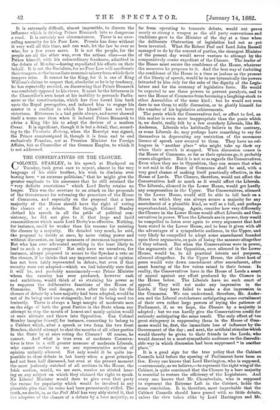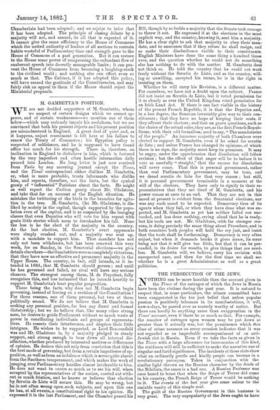THE CONSERVATIVES ON THE CLOSURE.
OLONEL STANLEY, in his speech at Blackpool on ki Tuesday, took great care to repeat, almost in the very language of his elder brother, his wish to disclaim ever having been " an extreme politician," that he might give the 'greater emphasis to his assurance that he still retained the " very definite convictions " which Lord Derby retains no longer. This was the overture to an attack on the proposals of the Government for reforming the procedure of the House of Commons, and especially on the proposal that a bare /majority of the House should have the right of voting the closure of a debate. But though Colonel Stanley clothed his speech in all the pride of political con- -sistency, he did not give to it that large and lucid reasonableness which made Lord Derby's so effective. Nothing, for instance, could be weaker than his reasons for resisting the closure by a majority. He dreaded very much, he said, bie proposal to decide at once, by mere voting power and without discussion, on large measures of enormous importance. But who has ever advocated anything in the least likely to lead to such a proposal ? Not only have we ourselves, for instance, always proposed to secure to the Speaker a veto on the closure, if he thinks that any important section of opinion has not been fairly represented in debate, but even if that -security were not adopted—which we feel tolerably sure that it -will be, and probably unanimously—no Prime Minister whom the country has ever produced, however rash '-and ambitious, would think of so straining his power as to suppress the deliberative functions of the House of Commons. The real danger, even after the rule for the closure of debate by a bare majority had been adopted, would be not of its being used too stringently, but of its being used too leniently. There is always a large margin of moderate men on the edge of both the great Parties in the State whom any attempt to stop the mouth of honest and manly opinion would at once alienate and throw into Opposition. Can Colonel 'Stanley imagine himself, for instance, consenting to belong to -a Cabinet which, after a speech or two from the two front Benches, should attempt to shut the mouths of all other parties in the State by at once voting the Closure ? Of course, he cannot. And what is true even of moderate Conserva- tives is true in a still greater measure of moderate Liberals, who cannot endure to see any representative section of -opinion unfairly silenced. Not only would it be quite im- possible to close debate in hot hurry when a great principle had not been half discussed, but even at the present moment the most jealously watched of all sections in the House, the Irish section, would, we are sure, receive no stinted hear- ing on any subject on which they claimed the right to speak. Ne Liberal Minister would dare to give even that party the excuse for popularity which would be involved in any plausible plea that its voice had been prematurely stifled. The truth, no-doubt, is, as the Pall Mall has very ably stated it, that the adoption of the closure of a debate by a bare majority, so
far from operating to truncate debate, would mot prove nearly so strong a weapon as the old party conventions and traditions gave to the Minister of the day at a time when the deliberate Obstruction of legislation had not as syet been invented. What Sir Robert Peel and Lord John Russell managed to do by the concert of parties, the strongest Minister of the present day would never venture to attempt by the comparatively coarse expedient of the Closure. The leader of the House must secure the confidence of the House, whatever the measures he proposes to it. And the best way of forfeiting the confidence of the House in a time as jealous as the present of the liberty of speech, would be to use tyrannically the powers intrusted to him only for the sake of the dignity of the Legis- lature and for the economy of legislative force. He would be expected to use those powers to prevent paralysis, and to save the House of Commons from becoming a laughing-stock to other Assemblies of the same kind ; but he would not even dare to use them to stifle discussion, or to glorify himself for the number of his legislative achievements.
The panic which the Conservatives feel, or affect to feel, on this matter is even more inappropriate than the panic which is, no doubt, really felt by a few crotchety Liberals, like Mr. Anderson. Liberals who habitually believe in the contrary, as some Liberals do, may perhaps have something to say for themselves in deprecating any restriction of the enormous licence of speech now secured to them. They have no col- leagues in " another place " 'who might take up their cry when their mouth is stopped. When discussion ceases in the House of Commons, so far as their opinions go, it probably ceases altogether. But it is not so as regards the Conservatives. Even when they are in Opposition, they can secure that what is not said in the House of Commons shall be said, with a very good chance of making itself practically effective, in the House of Lords. The Closure, therefore, would not affect the Conservatives half as much as it would affect the Liberals. The Liberals, silenced in the Lower House, would get hardly any compensation in the Upper. The Conservatives, silenced in the Lower Rouse, would still be able to fall back on a House in which they can always secure a majority for any amendment of a plausible kind, as well as a full, and perhaps superabundant, hearing. Again, consider how very differently the Closure in the Lower House would affect Liberals and Con- servatives in power. When the Liberals are in power, they would be compelled to listen over again to every argument that had been stated in the Lower House, and to hear it given with all the advantages of a sympathetic audience, in the Upper, and very likely be compelled to adopt some amendment founded upon these arguments, on pain of losing the measure altogether if they refused. But when the Conservatives were in power, the arguments of the Opposition, once silenced in the Lower House, would be, to all practical intents and purposes, silenced altogether. In the Upper House, the silent host of peers would vote down amendment after amendment, after scant hearing of the few voices raised in their favour. In reality, the Conservatives have in the House of Lords a court of appeal against any effect produced by the Closure in the House below. The Liberals have no such court of appeal. They will not make any impression in the Lords, if they have failed to make a due impression in the Commons. We can understand, therefore, Mr. Ander- son and the Liberal crotcheteers anticipating some curtailment of their own rather large powers of trying the patience of Parliament, if, as we hope, the Closure by a majority is adopted ; but we can hardly give the Conservatives credit for seriously anticipating the same result. The only effect of too great stringency in suppressing them in the House of Com- mons would be, first, the immediate loss of influence by the Government of the day ; and next, the artificial stimulus which would thereby be given to their friends in the Lords, who would descant to a most sympathetic audience on the discredit- able way in which discussion had been suppressed " in another place." It is a good sign for the true policy that the Cabinet Councils held before the opening of Parliament have 'been so few. Every one knows that Lord Hartington, who is supposed, —erroneously, as we believe,—to represent the right wing of the Cabinet, is quite convinced that the Closure by a bare majority is essential to restore the efficiency of the Legislature. And every one knows that Mr. Chamberlain, who is supposed to represent the Extreme Left in the Cabinet, holds the same conviction. It is, therefore, most improbable that the Cabinet Councils should have passed with so little debate, unless the view taken alike by Lord Hartington and Mr. Chamberlain had been adopted ; and we rejoice to infer that has been adopted. The principle of closing debate by a majority will not, and cannot, do all that is expected of it. It cannot give the same efficiency to the House of Commons which the united authority of leaders of all sections to restrain habits wasteful of Parliamentary time and strength gave to the House of Commons of a past generation. But it can restore to the House some power of compressing the redundant flow of exuberant speech into decently manageable limits ; it can pre- vent the House of Commons from becoming a laughing-stock to the civilised world ; and nothing else can effect even so much as that. The Cabinet, if it has adopted this policy, will have earned the gratitude of the Constituencies, and may fairly risk an appeal to them if the House should reject the Ministerial proposals.







































 Previous page
Previous page